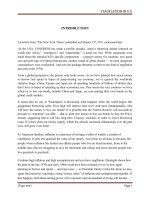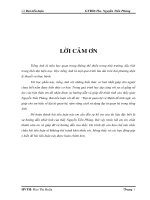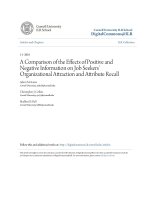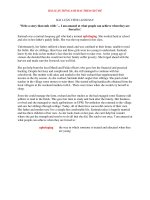Tiểu luận tiếng anh : Robinson Crusoe – A Representative of the English Bourgeoisie in the early 18th century
Bạn đang xem bản rút gọn của tài liệu. Xem và tải ngay bản đầy đủ của tài liệu tại đây (189.38 KB, 15 trang )
Hanoi open university
Faculty of English and Modern Languages
Assignment on
English and
AmericanLiterature
Title: “Robinson Crusoe – A
Representative of the English
Bourgeoisie in the early 18
th
century”
1
Hanoi, 2009
2
PART A: INTRODUCTION
The 18
th
century saw Great Britain rapidly growing into a capitalist
country. While in France the bourgeoisie was just beginning its struggle
against feudalism, the English bourgeoisie had already become one of the
ruling classes. In reality, the phenomena” land hedging and soil plundering”
occurred. Farmers were driven out of their own lands and fields were turned
into pastures for sheep-raising and wood-making industries. They had to join
the force of cheap labor and working in such factories. England became a
typical example of initial accumulation of capitalism. Holding power in
economics, the English bourgeoisie further encroached on the politic field.
They became the driving force in the English society. After actually
overthrowing the feudalism and establishing the Institutional Monarch system,
they led the country to the capitalist path and at that time, compromised with
the feudal class.
Together with the dragging state in terms of politics, economic
growth took tremendously prospective changes on the capitalist way of
developement. It can be said that the 18
th
century in England was an age of
intensively industrial development. The industrial revolution began: new
machinery was invented that turned Britain into the first capitalist power of
the world. The capitalist path paved the way for heavier exploitation relations.
The rocketing growth of industries required the need to trade with foreign
countries and to search for new sources of raw material, labour and market.
Thus, mostly under the pressure of the bourgeoisie, England waged many
wars for colonial expansions. By the middle of the 18
th
century, England
gained many colonies. It was a common saying that ” The sun never sets in the
Great Britain”.
3
The 18
th
century is known in the history of European culture as the
period of Enlightenment. In England the period of Enlightenment followed the
bourgeois revolution.” Enlightenment” indicates the historical role of the
bourgeoisie in the age of the Bourgeois Revolution in comparison with the
corrupt feudalism by recalling the contrast between dark and light. It also
implies the progress of the Ideological movement and of literature in the 18
th
century. The Enlightenment was a powerful intellectual movement to the
Enlighteners. The central problem of the Enlightenment ideology was that of
man and his nature. The Enlighteners thought it was their duty to enlighten
people and insisted on a systematic education for all. However, the English
Enlighteners had little revolutionary aims in their views and actions.
The Enlightenment epoch in English literature may be divided into
three periods: Early Enlightenment, Mature Enlightenment, and Late
Enlightenment . However, in the study, the English literature in the early 18
th
century or in the early Enlightenment will mostly be concentrated. This period
saw the flourishing of journalism. Numerous journals and newspapers not
only acquainted their readers with the situation at home and abroad, but also
helped to shape the views of people. Most popular were the satirical
moralizing journals. The Tatler , The Spectator, The Englishman edited by
Joseph Addison and Richard Steele. In their essays, these two writers touched
on various problems of political, social and family life. The essays paved the
way for the realistic novels brought into English literature by Daniel Defoe
and Jonathan Swift.
Furthermore, at that time, there appeared numerous works about
voyages and all kind of adventures that became popular. People who liked to
reach and explore remote land like Robinson Crusoe in the same-named novel
by Daniel Defoe became typical form of people at that time.
4
Daniel Defoe was born in London in 1660. His father , whose name
was Foe, wanted him to become a priest, but he decided to engage in
bussiness.His father was wealthy enough to give Defoe a good education and
future. It was Defoe’s cherished desire to become a rich merchant , but his
bussiness was not unsuccessful and he went bankrupt more than once. As a
result, he was always in debt. The only branch of business that he proved quite
successfully is literature. His first literary works were satirical poems dealing
with the urgent problems of the time. Daniel Defoe is also rightly considered
the father of the English and the European novel. His first and most popular
novel “ The Life and Strange Surprising Adventures of Robinson Crusoe” or
“ Robinson Crusoe” in short was written in 1719 when Defoe was about 60. It
was followed by Captain Singleton, Moll Flanders, Roxana and some other
novels of adventure.
Defoe’s strength as novelist lies in his realism. Every novel written
by him could make readers feel the air of verisimilitude. In fact, he was so
successful in writing ” Robinson Crusoe”. Through this realistic novel, the
characteristics and features of the English bourgeoisie in the early 18
th
century
were best reflected. Robinson Crusoe, the hero of the novel, became the
typical representative of the English bourgeoisie at the time.
5
PART B: DEVELOPMENT
The English bourgeoisie in the 18
th
century, especially in the
earlier decades of the century had some typical features. At that time,
England was experiencing the atmosphere of the Enlightenment. Men of the
epoch were men of reason, discovery and have independent attitudes toward
nature. The bourgeois citizens were considered new form of people of the
time. Obviously, the bourgeoisie was the driving force of the English society
at that time. They thought they had rights to be proud of their status in society
and in the superiority of their race. They wanted other countries to give way to
English men. Therefore, they implemented many brutal and unjust wars. In
fact, the English colonization and slave trades rose rapidly in the 18
th
century.
The rapid industrial development of Britain in the 18
th
century went
hand in hand with the process colonization of other countries and with an
intensive growth of colonial trade. British merchant ships could be seen in
different parts of the worlds. The British bourgeoisie was always sensible to
make and accumulate money as well as property. This would somehow lead
them to have quite poor spiritual lives because they were only concerned
making money.
However, the English bourgeoisie in the early 18
th
century had such
good qualities as optimism, industriousness, human strength, courage, and so
on. In conclusion, the English bourgeoisie in the 18
th
century was profoundly
influenced by the socio-political background of the time.This class was indeed
a complicated entity characterized by progressive and regressive features
mixing and confining to one another as well.
6









